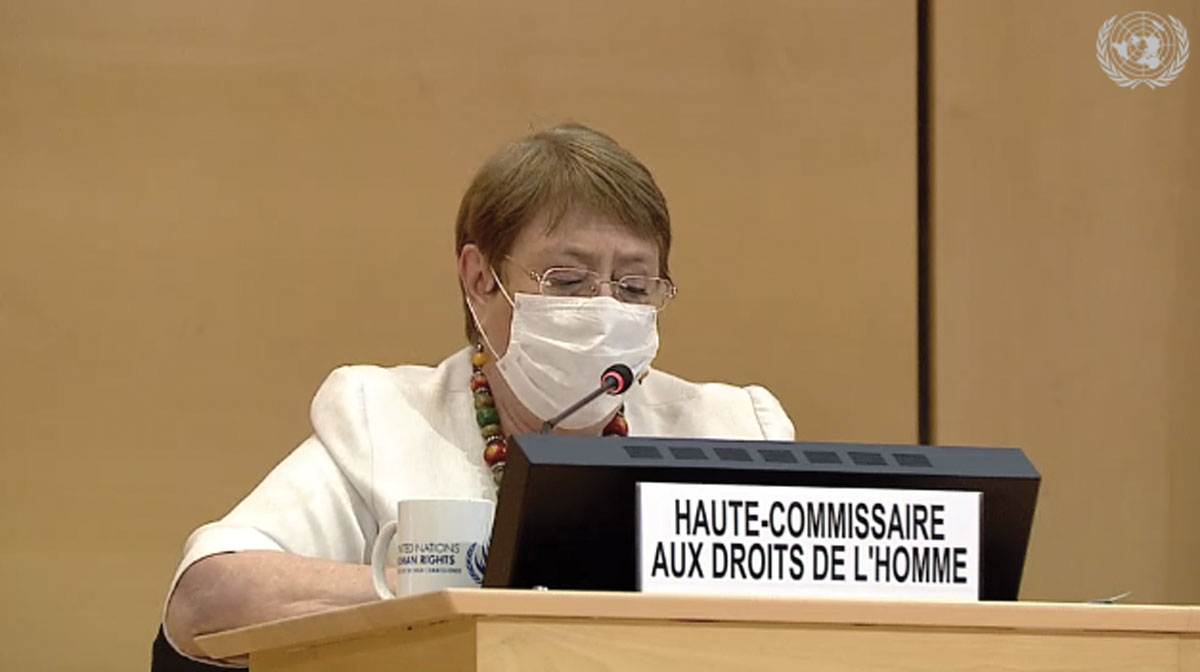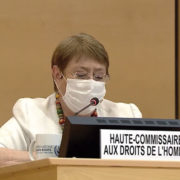
| Photo screengrabed from UN Web TV
THE United Nations’ human rights chief on Tuesday, June 30, appealed to President Rodrigo Duterte to “refrain from signing” the controversial anti-terrorism bill as it “heightens concerns about the blurring of important distinctions between criticism, criminality and terrorism.”
UN High Commissioner for Human Rights Michelle Bachelet also noted that human rights defenders have been routinely smeared as terrorists, enemies of the State and even viruses akin to the novel coronavirus.
“The law could have a further chilling effect on human rights and humanitarian work, hindering support to vulnerable and marginalized communities,” she said during the 44th regular session of the UN Human Rights Council.
“So I would urge the President to refrain from signing the law, and to initiate a broad-based consultation process to draft legislation that can effectively prevent and counter violent extremism – but which contains some safeguards to prevent its misuse against people engaged in peaceful criticism and advocacy,” she added.
Bachelet also said that her office is ready to assist in reviewing the proposed measure.
Duterte on June 22 said the bill was still being reviewed by Malacañang’s legal team.
The anti-terrorism bill, which seeks to strengthen the Human Security Act of 2007, grants any law enforcer to arrest and detain without warrant “a person suspected of committing any of the acts” punishable under the measure for 14 calendar days, extendable by 10 days.
The suspected “terrorist” can also be placed under surveillance for 60 days, extendable by up to 30 more days, by the police or the military.
Acts punishable under the bill include:
• Engaging in acts intended to cause death or serious bodily injury to any person, or endangers a person’s life;
• Engaging in acts intended to cause extensive damage or destruction to a government or public facility, public place, or private property;
• Engaging in acts intended to cause extensive interference with, damage, or destruction to critical infrastructure;
• Developing, manufacturing, possessing, acquiring, transporting, supplying or using weapons; and
• Releasing of dangerous substances, or causing fire, floods or explosions.
Any person who will propose, incite, conspire, participate in the planning, training, preparation, and facilitation of a terrorist act, as well as those who will provide material support to terrorists and recruit members in a terrorist organization, will also be penalized by life imprisonment without the benefit of parole.
Meanwhile, anyone who will threaten to commit terrorism, and those who will propose any terroristic acts or incite others to commit terrorism will suffer imprisonment of 12 years.
This goes the same for anyone who will voluntarily and knowingly join any organization, association or group of persons knowing that such is a terrorist organization.
Malacañang on June 9 confirmed that it had received a copy of the anti-terrorism bill.
The president has 30 days to act on the legislation or else the bill will lapse into law 30 days after receipt.





